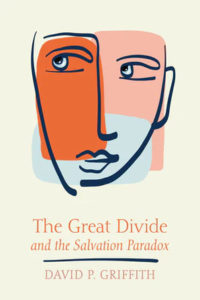 Now available from Pickwick Publications (Wipf & Stock): The Great Divide and the Salvation Paradox, by David P. Griffith (April 2022; 350pp+).
Now available from Pickwick Publications (Wipf & Stock): The Great Divide and the Salvation Paradox, by David P. Griffith (April 2022; 350pp+).
[Purchase: Pickwick Publications | Amazon]
Description:
The church in its first centuries split on whether Christ saved everyone or a few, Universalism versus Exclusivism. In the sixth century, the church settled the issue seemingly and held that Universalism was heresy. This book reviews this history as well as what provoked it–Scripture, on its face, gives two contradictory accounts of salvation’s extent: everyonea is ultimately saved and everyone is not. In contrast to both Exclusivism and Universalism, the book takes Scripture’s two accounts of salvation’s extent as true–that is, as a paradox. This is the approach the church has taken with other scriptural paradoxes. Saying one God is three, or one Son is both God and man, appeared to be contradictory too, but, to embrace Scripture entirely, these were seen as paradoxical. The Trinity modeled how one can be three, and the hypostatic union modeled how one can be two. For the paradox of salvation’s extent, the answer lies in the individual’s divisibility in the afterlife, one can be two. That is, in ultimate salvation, each individual can be both saved and unsaved.
Praise for The Great Divide and the Salvation Paradox:
“This subtle, learned, and intriguing analysis not only invites us to ponder anew some of the ultimate mysteries of the Christian revelation, but to see how the concept of paradox can encompass a wide range of apparently contradictory scriptural truths in order to underscore God’s gracious salvation in Christ. Those who follow David Griffith’s reasoning in this highly accomplished study will be enlightened and enrichened.” — D. Densil Morgan, University of Wales Trinity Saint David, Lampeter, emeritus
“Griffith’s innovative take on the Christian paradox of exclusive or universal salvation is to find the paradox applied to every individual. A person’s eternal life and character are divisible and thus subject to both divine acceptance and judgment. This is a fascinating exercise in constructive theology and in defining a person in relationship to the eternal God.” — J. Andrew Dearman, Fuller Theological Seminary
“‘Who then can be saved?’ The question reverberates through Christian history from New Testament times. Taking Scripture seriously and employing a whole host of ancient as well as modern sources, David Griffith offers a fresh and original approach to the Bible’s apparent advocacy of both a universal and an exclusive salvation. Erudite, stimulating, and lucid, the discussion is both constructive and provocative. Careful reading will yield insights into theological anthropology as well as Christian soteriology.” —Robert Pope, Westminster College, Cambridge
“This is a novel book with a fascinating argument. As Griffith indicates, the stalemate in Christianity between universal and limited salvation seems to be an intractable issue without resolution. However, Griffith has provided an original way forward that deserves recognition and careful consideration. A timely piece and a tour de force.” — Michael Burdett, University of Nottingham
[Purchase: Pickwick Publications | Amazon]








Discussion
Comments are turned off.
Comments are closed.